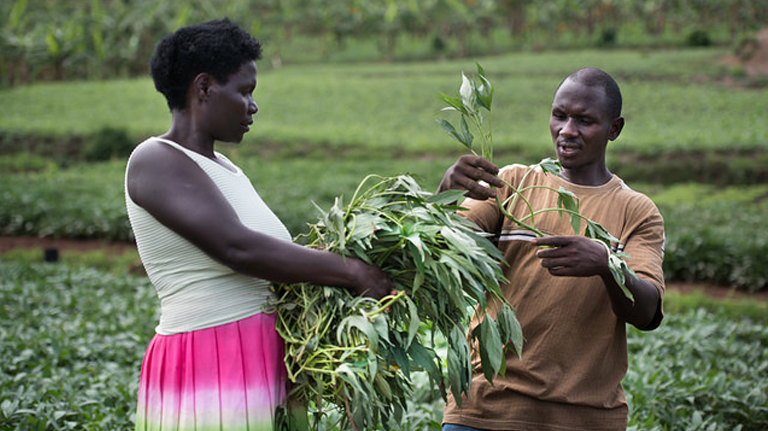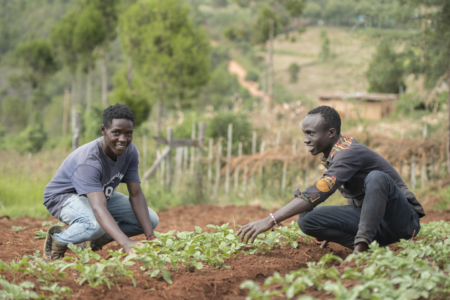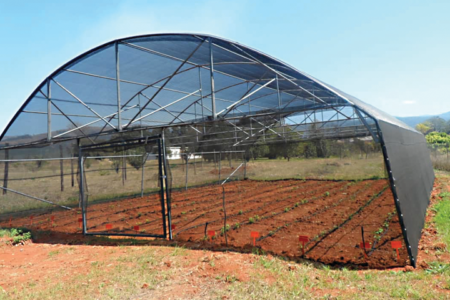
Roots and tubers have great potential to support food security and resilient livelihoods among the poorest and most vulnerable people around the globe. The FoodSTART program, which promotes production and marketing of these underexploited crops, has already proven highly successful in Asia, and this project will extend the benefits to poor farming families in sub-Saharan Africa.
Background
While maize is the chief crop cultivated for food security and income generation in sub-Saharan Africa, root and tuber crops—including potato, sweetpotato, cassava and yam—are also popular, though often viewed as of secondary importance. Grown widely as staple foods for household consumption, roots and tubers provide a good source of energy, vitamins and micronutrients. They will grow in challenging conditions, can be harvested before the maize ripens, are suitable for sale in urban markets, and are often the responsibility of women. These crops could make a much larger contribution to building food security and climate-resilient livelihoods throughout the continent.
This project builds on the work of the International Potato Center (CIP) with root and tuber crops in Asia since 2011, conducted in partnership with the United Nation’s International Fund for Agricultural Development (IFAD) through the ‘Food security through Asian roots and tubers’ (FoodSTART) program. Project implementation in Africa will follow a similar approach, based on building collaboration among research and development stakeholders to test and scale out suitable interventions that support productivity, develop value chains and encourage business development.
Objectives
The overall goal of the project is to enhance food security, nutrition and incomes among poor farming households in Eswatini (formerly Swaziland), Madagascar and Mozambique. The priority beneficiaries are children, women and young people. The objective is to realize the potential of root and tuber crops to build food security and incomes through forming effective partnerships among national and international research organizations, and IFAD country programs and investment projects.
Approach
The target countries are among the most food insecure and poorest in sub-Saharan Africa and the project will focus on provinces and districts with high rates of malnutrition and vulnerability to climatic change. Activities will promote improved nutritious and consumer preferred varieties and link smallholders to markets to diversify family income sources. The project builds sustainability by focusing on improving knowledge of crop production and marketing and building the capacity of partner institutions, as well as by sharing knowledge and lessons among actors involved in similar activities in Africa, Asia and Latin America. Partners include national rural extension services, research institutes non-governmental organizations and the private sector.
The initiative also seeks to build synergy by collaborating with ongoing IFAD-funded projects in the relevant areas. Specific investment opportunities will be sought across the IFAD project portfolio to maximize the contribution of roots and tubers to national development goals.
Expected outcomes
By introducing improved varieties (including biofortified strains) and enhanced production methods, the project will directly benefit 115,000 farmers in the five countries.
Special focus will be given to households encompassing women of childbearing age and children aged less than five years, since these groups are at greatest risk of malnutrition and its long-term debilitating effects. Farmers will be fully involved in participatory varietal evaluation activities and will learn how to conserve and multiply their crops to increase availability of planting materials. Income diversification will be encouraged by introducing new processing and storage technologies, and by working with local businesses, consumers and rural advisory services to stimulate demand.
Capacity development for national agricultural research and extension systems will lay the foundations for widespread dissemination of the new varieties, improved agricultural practices and marketing approaches.
Additional knowledge management activities will include documenting and analyzing results across project components and countries, exchanging knowledge with other CIP research programs, and sharing results with a broad group of stakeholders.
The FoodSTART model of collaboration emphasizes partnerships and learning, with two main pathways for increasing scale: via commercial processing (and associated supply chains), and by including roots and tubers in national development planning. This approach can be rolled out to additional countries having similar agro-ecologies and nutrition challenges, and where roots and tubers are underutilized. These include Angola, Burundi, Ethiopia, Kenya, Malawi, Rwanda, Tanzania, Uganda and Zambia.
| Key outputs | Target |
| Increased investment in roots and tubers in each country | USD 2 million |
| Farmers adopting improved management of root and tuber crops | 115,000 |
| Farmers trained in small-scale commercial seed enterprises | 200 |
| National agricultural research and extension technicians trained in agronomy and marketing | 200 |
| Institutions engaged in sharing knowledge in each country | 20 |
Contact
Simon Heck
CIP, Kenya
s.heck@cgiar.org
Thanks to our donors




